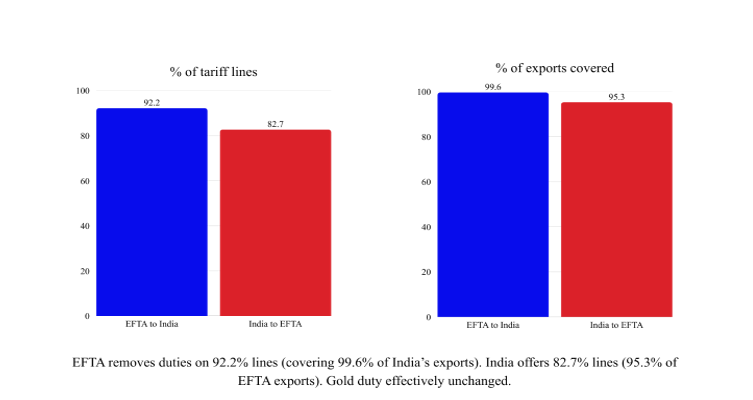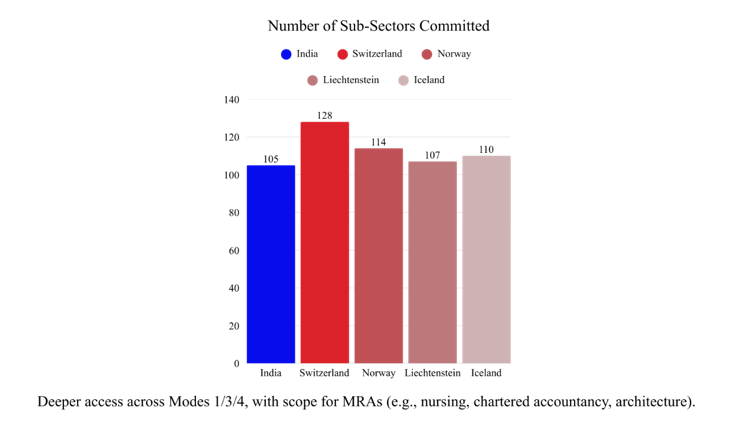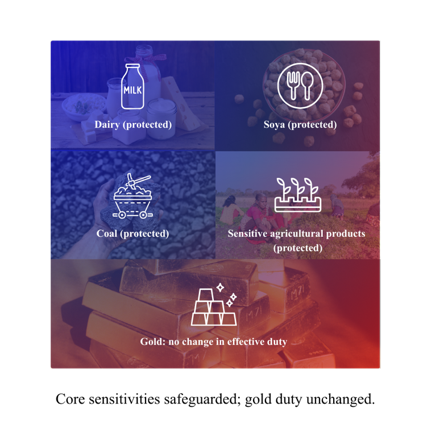India-European Free Trade Association Trade and Economic Partnership Agreement (TEPA) to come into effect on 01 October 2025
India-European Free Trade Association Trade and Economic Partnership Agreement (TEPA) to come into effect on 01 October 2025
India-European Free Trade Association(EFTA) Trade and Economic Partnership Agreement (TEPA) will come into effect on 01 October 2025. The agreement was signed on 10th March 2024 at New Delhi.TEPA is a modern and ambitious agreement that incorporates, for the first time in any Free Trade Agreement (FTA) signed by India, a commitment linked to investment and job creation.
The agreement comprises of 14 chapters with main focus on market access related to goods, rules of origin, trade facilitation, trade remedies, sanitary and phytosanitary measures, technical barriers to trade, investment promotion, market access on services, intellectual property rights, trade and sustainable development and other legal and horizontal provisions.
The EFTA’s market access offer under TEPA covers 100% of non-agri products and tariff concession on Processed Agricultural Products (PAP). Sensitivity related to PLI in sectors such as pharma, medical devices & processed food etc. have been taken while extending offers.
The agreement goes beyond goods and services and committed to promote investments with the aim to increase the stock of foreign direct investments by USD 100 billion in India in the next 15 years, and to facilitate the generation of 1 million direct employment in India, through such investments.
Key features of the agreement
EFTA is an important regional group, with several growing opportunities for enhancing international trade in goods and services. EFTA is one important economic block out of the three (other two – EU &UK) in Europe. Among EFTA countries, Switzerland is the largest trading partner of India followed by Norway.
The TEPA will empower India’s exporters by providing access to specialized inputs and create conducive trade and investment environment. This would boost exports of Indian made goods as well as provide opportunities for services sector to access more markets.
Investment and Employment Commitments
As per Article 7.1 of TEPA , the EFTA States shall aim to increase foreign direct investment (FDI) from their investors into India by USD 50 billion within 10 years from the entry into force of the Agreement, and an additional USD 50 billion in the succeeding 5 years, amounting to a total of USD 100 billion over 15 years. Concurrently, the EFTA States shall aim to facilitate the generation of 1 million direct jobs in India resulting from these investment inflows.
This investment commitment explicitly excludes foreign portfolio investment (FPI), focusing on long-term capital for productive capacity building.
Market Access for Goods
Under TEPA, EFTA has offered 92.2% of tariff lines encompassing 99.6% of India’s exports. Includes 100% of non-agricultural products and tariff concessions on Processed Agricultural Products (PAP).
India’s offer to EFTA covers 82.7% of tariff lines, accounting for 95.3% of EFTA exports. Over 80% of these imports are Gold, with no change in effective duty on Gold. Sensitive sectors protected, including pharma, medical devices, processed food, dairy, soya, coal, and sensitive agricultural products.

Boost for Services and Mobility
India has offered commitments in 105 sub-sectors. EFTA commitments: 128 (Switzerland), 114 (Norway), 107 (Liechtenstein), 110 (Iceland). TEPA enables Mutual Recognition Agreements (MRAs) in professional services such as nursing, chartered accountancy, and architecture
TEPA presents stronger opportunities in IT, business services, cultural and recreational services, education, and audio-visual services.
Improved access via: Mode 1: Digital delivery of services, Mode 3: Commercial presence and Mode 4: Greater certainty for entry and temporary stay of key personnel.
Intellectual Property Rights
TEPA ensures IPR commitments at TRIPS level. The IPR chapter with Switzerland has high standard for IPR, shows the robust IPR regime. India’s interests in generic medicines and concerns related to evergreening of patents have been fully addressed.
Sustainable and Inclusive Development
TEPA emphasizes sustainable development, inclusive growth, social progress, and environmental protection. It will foster transparency, efficiency, simplification, harmonization, and consistency in trade procedures.
Employment, Skills and Technology Collaboration
TEPA would accelerate creation of large number of direct jobs for India’s young aspirational workforce in next 15 years in India, including better facilities for vocational and technical training. TEPA also facilitates technology collaboration and access to world leading technologies in precision engineering, health sciences, renewable energy, Innovation and Research & Development.
Sector wise gains under TEPA
The India-EFTA Trade and economic Partnership Agreement unlock opportunities across wide range of industries. With EFTA’s offer covering 92% of tariff lines, Indian exporters in sectors like machinery, organic chemicals, textiles, and processed foods will enjoy significantly improved access to EFTA markets though TEPA. This will enhance competitiveness, reduce compliance costs and accelerate access to EFTA market.
Agriculture and Allied Goods
EFTA Nations
Products / HS Codes
Tariff Concessions / Opportunities
Switzerland
Food Preparations
Tariffs up to 127.5 CHF/100 kg eliminated; scope for Indian exports
Confectionery, Biscuits
Duty cuts create opportunities in processed foods
Fresh Grapes
Tariffs up to 272 CHF/100 kg eliminated
Nuts & Seeds, Fresh Vegetables
Zero tariffs post FTA, boosting competitiveness
Norway
Food Preparations, Condiments
Duty-free access on several tariff lines
Rice
Tariff reductions (non-feed purposes) open new markets
Processed Vegetables & Fruits
Duty-free access on selected lines
Biscuits, Malt Extracts, Beverages
Tariff relief improves access for Indian brands
Iceland
Processed Foods
High MFN tariffs (up to 97 ISK/kg) cut to zero
Chocolate & Confectionery
Duties eliminated; strong potential for processed food exports
Fresh/Chilled Vegetables
Tariff elimination
Coffee
Tea
Marine Products
Textiles and Clothing
Leather and Footwear
Sports Goods and Toys
Engineering Goods
Gems and Jewellery
Electronics and Software
Strategic Edge: Leverage TEPA’s IPR chapter to protect proprietary tech
Strategic Edge: Align with Norway’s climate tech goals and public procurement Channels
Strategic Edge: Target niche distributors and public health initiatives
Strategic Edge: Position India as a reliable EMS partner for European OEMs.
Chemicals and Allied Products
Plastics and Shellac based products

INVESTMENT PROMOTION

Conclusion
The India–EFTA Trade and Economic Partnership Agreement (TEPA) marks a historic milestone, establishing India’s first FTA with four developed European nations and committing USD 100 billion in investments and 1 million direct jobs over 15 years. TEPA enhances market access for goods and services, strengthens intellectual property rights, and fosters sustainable, inclusive development, while supporting Make in India and Atmanirbhar Bharat initiatives.
Complementing this, the India–EFTA Desk has been inaugurated as a single-window platform to facilitate EFTA investments in renewable energy, life sciences, engineering, and digital transformation, while fostering joint ventures, SME collaborations, and technology partnerships.
TEPA is a “model agreement” and reaffirms India’s readiness to build a robust future with EFTA.
References:
Ministry of Commerce and Industry